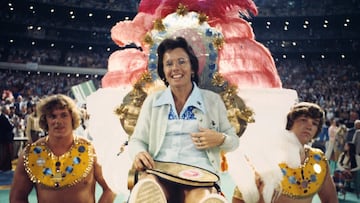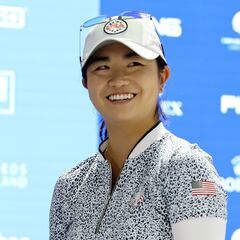50 years after the ‘Battle of the Sexes,’ Billie Jean King says women ‘are not done yet’
In 1973, the tennis icon triumphed over Bobby Riggs, not only in a battle for gender equality in women’s sports but also to showcase the recently established WTA (Women’s Tennis Association).

Half a century ago, in a historic event famously known as the “Battle of the Sexes,” women’s tennis champion Billie Jean King defeated men’s tennis legend Bobby Riggs in three consecutive sets. Beyond being a sports spectacle, this exhibition served as a platform for King to advance the women’s rights movement and shed light on gender inequality in tennis.
The highly publicized match occurred on September 20, 1973, at Houston’s Astrodome. At the time, King was 29 years old and the world’s top-ranked women’s player, while Riggs, aged 55, had been a prominent men’s player in the late 1930s and ‘40s, and he had been a controversial figure for feminists.
50 years ago.
— US Open Tennis (@usopen) September 20, 2023
A victory that went beyond the tennis court for @BillieJeanKing. pic.twitter.com/o1neRklZ9D
After a two-hour contest, King emerged victorious with scores of 6‐4, 6‐3, 6‐3 in an environment The New York Times described as “more suited for a circus than a sports event.” The match drew an astounding crowd of over 30,000 spectators in the stadium, marking the largest attendance for a tennis match. Millions more watched the event on national television, and countless others tuned in via satellite broadcasts in 36 different countries.
Reflecting on this historic event, King shared a message, emphasizing that it transcended mere tennis.
Related stories
“It was a catalyst for social change & one of the most important days of my life,” she wrote on X, formerly known as Twitter. “We have come a long way since 1973, but we are not done yet. Let’s keep going for it.”
The Battle of the Sexes was played 50 years ago today.
— Billie Jean King (@BillieJeanKing) September 20, 2023
More than a tennis match, it was a catalyst for social change & one of the most important days of my life.
We have come a long way since 1973, but we are not done yet.
Let's keep going for it.
📷:@GettySport #BOTS50 pic.twitter.com/J5S7eeYXOr
Billie Jean King brought equality to women’s sports
In 1973, spurred by King’s advocacy, the U.S. Tennis Association made the U.S. Open that year the first sporting event to offer equal prize money to both women and men. Equal pay in the other three Grand Slam tournaments would come decades later.


